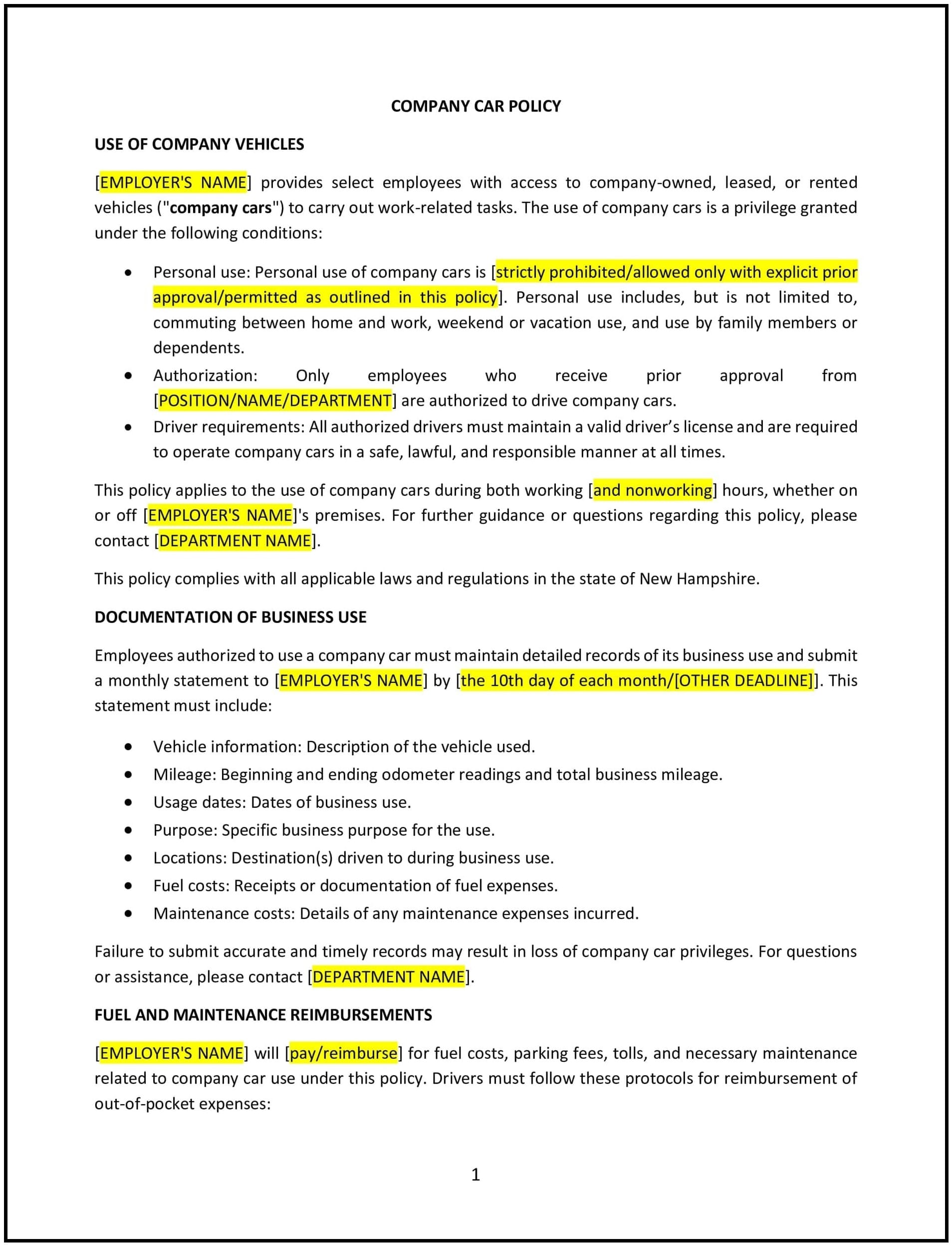Got contracts to review? While you're here for policies, let Cobrief make contract review effortless—start your free review now.

Customize this template for free
Company car policy (New Hampshire)
A company car policy helps New Hampshire businesses set clear guidelines for the use of company-provided vehicles. This policy outlines the responsibilities of employees using company cars, the types of vehicles that may be used, and the terms and conditions for personal and business use.
By adopting this policy, businesses in New Hampshire can manage the use of company cars, ensuring they are used responsibly and in accordance with company values, while protecting the business from potential liabilities.
How to use this company car policy (New Hampshire)
- Define eligibility: Specify which employees are eligible for a company car, including factors such as job role, business need, or seniority.
- Set rules for vehicle use: Establish clear rules regarding the personal and business use of company cars, including when the car can be used for personal errands, commuting, or off-duty activities.
- Outline maintenance responsibilities: Specify who is responsible for the maintenance, repairs, and insurance of the company car, including guidelines for regular maintenance checks and repairs.
- Address fuel and other expenses: Clarify which expenses, such as fuel, tolls, and parking, will be covered by the company, and which costs are the responsibility of the employee.
- Set vehicle return conditions: Define the process for returning the vehicle, including any expectations about the condition of the car, cleaning requirements, and when the car should be returned (e.g., upon termination of employment).
- Implement insurance coverage: Outline the company’s insurance coverage for the vehicle and whether the employee is required to maintain personal insurance or cover any deductibles in case of accidents.
- Address safety and driving conduct: Specify expectations for safe driving, adherence to traffic laws, and what actions employees should take in case of an accident, including reporting procedures and accident documentation.
- Review and update: Regularly review the policy to ensure it reflects New Hampshire regulations and evolving company practices.
Benefits of using this company car policy (New Hampshire)
This policy provides several benefits for New Hampshire businesses:
- Reduces legal risks: Helps businesses manage legal and insurance-related risks by clearly outlining the terms of vehicle use, including responsibilities for maintenance, accidents, and personal use.
- Enhances employee accountability: Encourages employees to use company cars responsibly by setting clear guidelines for personal and business use, helping to maintain the condition of the vehicle.
- Increases business efficiency: Ensures that employees who need a company car for business purposes can use them effectively and without confusion regarding the terms of use.
- Protects company assets: Helps safeguard company vehicles and minimizes the risk of misuse or damage by clearly defining expectations for vehicle care and conduct.
- Promotes a professional image: By providing company cars with clear guidelines, businesses can ensure that their vehicles are used in ways that reflect the company’s professionalism and values.
Tips for using this company car policy (New Hampshire)
- Communicate the policy clearly: Ensure that all eligible employees are aware of the company car policy and understand the rules surrounding vehicle use, maintenance, and reporting accidents.
- Track vehicle usage: Implement a system for monitoring and tracking company car usage, ensuring employees comply with the terms of the policy and reporting any issues or accidents promptly.
- Provide necessary training: Offer training for employees on safe driving practices, the responsibilities associated with using a company car, and how to handle any situations that may arise while driving.
- Monitor vehicle condition: Regularly inspect company vehicles to ensure they are in good working condition and address any maintenance issues before they become serious problems.
- Review the policy regularly: Review and update the policy as needed to reflect changes in New Hampshire state laws, business operations, or company needs.